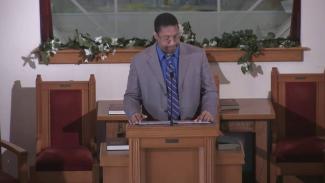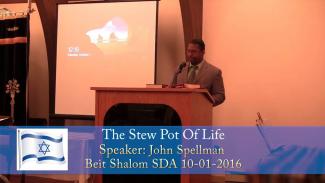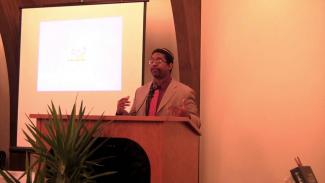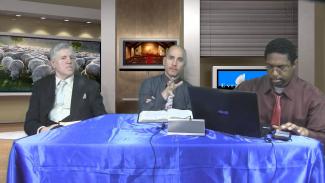John Spellman speaks on Luke 17, focusing on the 10 lepers whom Jesus healed. Of these 10 lepers only 1, a Samaritan, returned to glorify God. What can we learn from this powerful story about our relationship with God. Are we like the 9 lepers who never returned? Or are we like the one that glorified God?
2016 Broadcasts
Choose from all 2016 broadcasts or select a topic from the menu.What motivated Job to fear God? Was it from a place of love, trust, and appreciation? Or did Job only serve God for what he could obtain from God? What are our reasons for serving God? Why does God permit His people to be tested in faith? Why were Satan’s accusations against Job made in a public forum? How did Job’s triumph discredit Satan? How did Jesus ultimately discredit the lies of the devil? How did Job succeed where Adam and Eve fell short? Can we trust God in times of hardship and adversity?
How does God deal with Jonah after trying to hide? What might this mean for how God deals with us? What was the belly of the fish designed to teach Jonah? What can we learn from God even while at the lowest points of our lives? What does Jonah's name mean and what lessons can we learn from it about how God transforms our lives today? How could our darkest moments in life be used by God to bring us into the light of understanding?
What can we learn about the unseen realm from the story of Job? What is the relationship between what goes on in heaven and what happens here on earth? What can we learn about the war between good and evil? Why did God defend Job against Satan? Who is God as a person? Can we trust God? Why didn’t God destroy the devil right away? What can we know about the Great Controversy from the Bible? What is the mystery of lawlessness? How did Jesus redeem humanity and vindicate the character of God? Why is God on trial?
John Spellman preaches at the Beit Shalom SDA Congregation on 2 Kings 4:38-44. During a time of famine in Gilgal, the sons of the prophets were hungry. Elisha tells them to make a pot of stew. But in one man's effort to gather the ingredients, he accidentally introduces a poisonous substance to the stew pot. The sons of the prophets proclaim that there is death in the pot. How can this relate to our Christian experience today? What is in the stew pot of our lives? Do we sometimes poison ourselves without knowing it?
What can we learn from the end of the story of Job? Does Job have a happy ending, or is he still awaiting his happy ending? What can this book teach us about human suffering for those who love God? Does God bless us in the here and now? What are the rewards of trusting God? Who can we depend on when family, friends, and acquaintances turn their backs on us? Is death truly the end of life’s story? How can the second coming of Jesus impact how we relate to hardship and difficulties in our lives? Did Job understand the doctrine of the resurrection?
What are the ways in which we hide from God? How does God get involved in our lives when we run from what He asks us to do? How can our choices impact the lives of others around us? How can God use situations in which we make mistakes to reach others, especially after we have been poor witnesses? Can God use unbelievers to reach backsliden believers? Can the difficulties we face in our lives sometimes be God drawing us back into relationship with Him? Can we be spiritually sleeping while others with less light than we have are more awake than we are?
How are Christians supposed to wait for the second coming of Jesus? What does this waiting time look like? Should they do nothing and be passive as they wait for the master, or are Christians called to do something? What is God’s mission and purpose for the church awaiting His return? What does repentance, revival, reformation, faith, and works have to do with our waiting experience? How did Jesus describe our responsibilities in his farming parables? In what ways do our roles differ and what should be our attitude toward sowing, reaping, and nurturing?
Christians are to seek the peace and prosperity of the cities we live in. How does this peace and prosperity help our mission? How did Paul minister to the needs of the various ethnic groups, cultures, personalities, and languages of his time? Is God really concerned with the hurting and suffering of humanity? What impact should the suffering of others have on believers? What are the different ways people may respond to the gospel and how can the church respond? How did the parable of the sower relate to our end time mission to reach the cities of the world?
Have you ever felt like God was too late? Have you ever had a delay in your answer to prayer? If God loves us, why doesn't He always answer requests right away? When Lazarus died because Jesus was delayed for two days, they might have had similar questions. Jesus taught them a powerful lesson about what happens when people think God is too late. John Spellman preaches at the Beit Shalom SDA Congregation.
Can a person really hide from God? What are the ways in which people hide from God today? How does God respond when people reject His calling? How does the story of Jonah illustrate God's dealings with humanity as we sometimes stray and do our own thing? Do we really trust that what God wants for us is really what is best for us?
How did Jesus lead people to follow Him? How can we do the same today? Does God use flawed people to draw people to Jesus? What role does the church play in bridging the gap between humanity and God? How does God speak to people today? How can we discern the voice of God amid all the other voices which compete for our attention? How does the story of Zacchaeus show that God is often seeking out us when we think it’s difficult for us to seek him? Is God still reaching out to people today? Should we be passive or active in reaching people?












